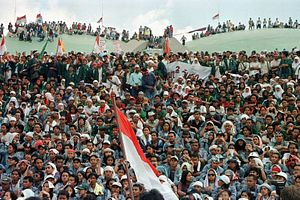Indonesia has a remarkable story to tell. Drawn together from ancient kingdoms through colonization and occupation, galvanized through a protracted war of independence, consolidated under authoritarianism, the country has emerged as a vibrant yet complex democracy. Just two decades old, the country’s political system enjoys strong support among citizens and Indonesia boasts a strong and independent press. In 1998, the situation looked dire and, as has since been repeated, analysts feared at the time the country’s economic troubles and mushrooming communal violence would lead to the breakup of the world’s largest archipelagic state. How Indonesia emerged from the ashes of the authoritarian New Order era is an important study in tenacity and policy.
The state of Indonesia’s democracy is more pertinent as commentators rush to declare the general demise of democracy around the world. Across the world and particularly in newer democracies, it’s argued, norms are being rolled back slowly toward more centralized power in the hands of populist leaders. In 2017, democracy faced its “most serious crisis in decades,” according to Freedom House, with 71 countries experiencing net declines in political rights and liberties and only 35 showing net gains. Time recently declared “the era of the strongman,” featuring on their cover Russia’s Vladimir Putin, Rodrigo Duterte of the Philippines, Recep Tayyip Erdoğan of Turkey, and Hungary’s Viktor Orban. In the past few years, the people of India, Austria, Malaysia, and the United States have democratically elected populist leaders in countries where tolerance and plurality are under threat.
Indonesia’s politics and society have bucked only some of these global trends. Incumbent President Joko “Jokowi” Widodo’s mandate and the tenacity of Indonesia’s democracy currently rest on 20 years of consolidation. But is it enough to prevent backsliding? How much has changed since 1998?

































